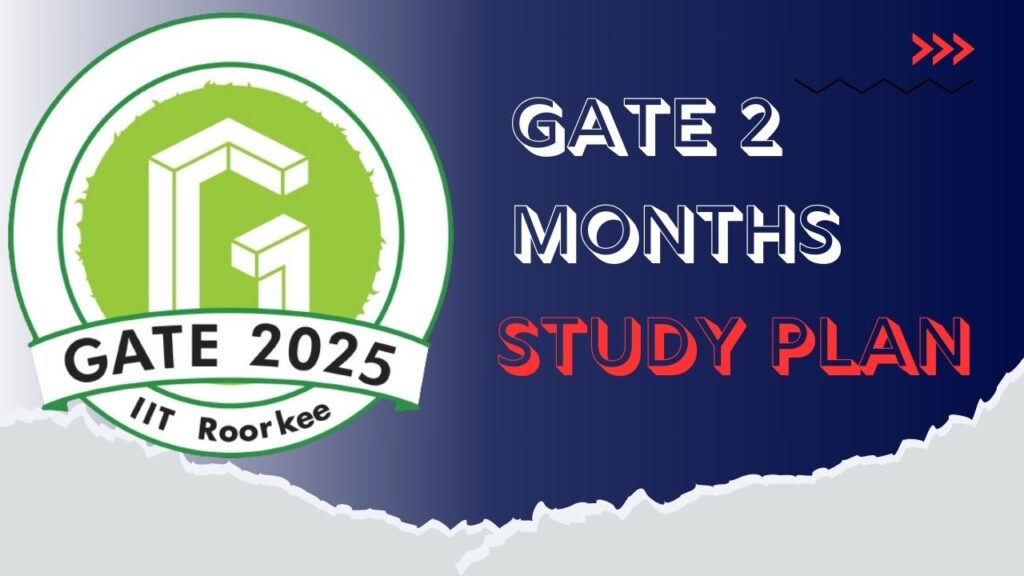In this article, we will guide you in creating an adequate Gate 2 months study plan and How to Crack GATE 2025 Within 60 Days, framed to benefit the aspirants to can bring out the best and can clear one of the toughest tests in India.

Also learn : GATE 2025 Admit Card Release
GATE 2 Months Study Plan: How to Crack GATE 2025 Within 60 Days
This Graduate Aptitude Test in Engineering is not merely an entrance test for post-graduation but a gateway to various job opportunities such as a master’s degree through top institutes like IITs and NITs, jobs at public sector companies, and research and innovation in different fields.
The exam for GATE 2025 is fast approaching, which means it is essential to plan a timetable. Success lies in appropriately understanding the concepts and prioritising topics while doing extensive practice and time allocation. Every branch of engineering has some unique factors that make it different from others. This is why not going with a general plan to study for GATE entrances. The following guide will help you craft an individualized plan that will take into account your strengths and weaknesses, all while making sure you keep ahead of the competition.
So, if you are completely new to your preparation or just regarding revamping the old concepts, this article is meant to be your greatest route map to success at the examination for GATE 2025.
Understanding the Gate 2 months study plan Exam Pattern and Syllabus
Before diving into your Gate 2 months study plan, it’s essential to have a clear understanding of the exam pattern and syllabus. Knowing what to expect will help you create a focused preparation strategy tailored to the specific demands of the exam.
GATE 60 Days study plan Exam Pattern
The GATE exam evaluates your conceptual knowledge and problem-solving abilities in your chosen engineering field. Here’s an overview of the GATE 2025 exam structure:
| Aspect | Details |
| Mode of Exam | Computer-Based Test (CBT) |
| Duration | 3 Hours |
| Total Questions | 65 |
| Maximum Marks | 100 |
| Question Types | MCQs, MSQs (Multiple Select Questions), and NAT (Numerical Answer Type) |
| Sections | General Aptitude (15 marks), Engineering Mathematics (10-13 marks), and Core Subject (72-75 marks) |
Key Points to Note on Gate 2 months study plan
- General Aptitude is common for all streams and is relatively scoring.
- Engineering Mathematics is crucial as it carries significant weight in most papers.
- Core Subject questions require in-depth understanding and application of concepts.
Gate 2 months study plan Syllabus Overview
The syllabus varies depending on your stream. While each stream has its unique subjects, here are some general components applicable to most:
General Aptitude to be considered for Gate 2 months study plan
- Verbal Ability: English grammar, sentence completion, and word analogy.
- Quantitative Aptitude: Numerical computation, data interpretation, and reasoning.
Engineering Mathematics (varies by stream) to be considered for Gate 2 months study plan
- Linear Algebra, Calculus, Probability, and Differential Equations.
- Stream-specific topics like Fourier Series, Complex Analysis, etc.
Core Subjects to be considered for Gate 2 months study plan
- Varies significantly based on the discipline (e.g., Mechanical Engineering, Computer Science, Civil Engineering).
Refer to the official GATE 2025 syllabus PDF for stream-specific details and focus on high-weightage topics.
Steps to Build an Effective Gate 2 months study plan
Crafting a well-organized Gate 2 months study plan is key to acing the exam. Success depends not only on the number of hours you study but also on the efficiency and focus of your preparation. Follow these steps to design a personalized study plan that aligns with your goals and strengths.
Set Clear Goals
- Define Your Target Score: Research the previous years’ GATE cut-offs for your desired institute or job and set a realistic target percentile.
- Identify Your Strengths and Weaknesses: List topics you excel in and those requiring more effort. This helps prioritize your study plan.
- Divide the Syllabus into Manageable Sections: Break the syllabus into smaller topics and categorize them into high-priority (frequent and high-weightage topics) and low-priority (less common topics).
Create a Realistic Schedule on Gate 2 months study plan
| Day | Focus Area | Hours Allocated |
| Weekdays | Core Subjects + Numerical Practice | 6–8 Hours |
| Weekends | Mock Tests + Revision | 8–10 Hour |
Daily, Weekly, and Monthly Preparation Goals for GATE 2025
A strategic and well-defined preparation plan, divided into daily, weekly, and monthly goals, ensures steady progress and prevents last-minute panic. Here’s how to structure your preparation effectively for the GATE 2025 exam.
Daily Goals
Focus on achieving small, measurable targets every day to build momentum.
- Core Subject Study (3–4 hours): Cover one topic thoroughly, starting with high-weightage areas like Thermodynamics (Mechanical) or Data Structures (Computer Science).
- Practice Numerical Problems (1–2 hours): Solve at least 20–30 questions daily.
- General Aptitude (30–60 minutes): Solve a few verbal and quantitative problems daily to ensure consistent practice.
Weekly Goals
Every week should end with measurable progress, such as completing sections of the syllabus or improving performance on practice tests.
- Complete 2–3 Topics: Divide your syllabus into manageable chunks and aim to complete 2–3 topics each week.
- Take a Mock Test: Schedule one mock test every weekend.
- Review Notes and Formulas: Dedicate time to revisiting important concepts and practicing problem-solving techniques.
Monthly Goals
Each month should have a broader objective, such as completing a significant portion of the syllabus or mastering specific subjects.
- First Month: Build Fundamentals
- Second Month: Enhance Problem-Solving Skills
- Third Month: Intensive Revision and Final Preparation
Essential Study Materials and Resources for GATE 2025
Choosing the right study materials and resources is crucial for an efficient and effective Gate 2 months study plan. With the vast syllabus and diverse question patterns, leveraging high-quality resources can make a significant difference in your preparation. Here’s a curated list of essential books, online platforms, and tools to aid your journey.
Standard Reference Books
Well-structured books are the backbone of GATE preparation. Below is a list of recommended books for major engineering disciplines:
| Discipline | Subject | Book |
| Mechanical Engineering | Strength of Materials | SS Rattan / Gere & Timoshenko |
| Fluid Mechanics | RK Bansal | |
| Thermodynamics | PK Nag | |
| Computer Science | Algorithms | CLRS (Introduction to Algorithms) |
| Operating Systems | Galvin | |
| Database Systems | Korth | |
| Electrical Engineering | Power Systems | C.L. Wadhwa |
| Electrical Machines | PS Bimbhra | |
| Control Systems | Norman S. Nise | |
| Civil Engineering | Structural Analysis | RC Hibbeler / Ramamrutham |
| Environmental Engineering | SK Garg | |
| Geotechnical Engineering | Gopal Ranjan & ASR Rao |
Online Platforms and Video Lectures
For conceptual clarity and additional problem-solving techniques, online resources can be invaluable.
NPTEL (National Programme on Technology Enhanced Learning)
- Free video lectures by IIT professors.
- Covers core engineering topics with detailed explanations.
Unacademy, Gradeup, or BYJU’s GATE Courses
- Offers structured courses tailored to the GATE syllabus.
- Includes live classes, doubt-clearing sessions, and test series.
YouTube Channels
- Explore GATE Academy, Made Easy, or GateForum for quick concept videos and tricks.
Previous Year Question Papers and Mock Tests
- Solve at least the past 10 years’ GATE question papers to familiarize yourself with the pattern and frequently asked questions.
- Enroll in a test series from reputed coaching institutes like Made Easy or ACE Academy.
- Take sectional and full-length mock tests to simulate real exam conditions.
- Use performance analytics to improve weak areas.
Practice and Revision Strategies for Gate 2 months study plan
Effective preparation for the GATE 2025 exam doesn’t end with covering the syllabus; it’s the practice and revision phase that solidifies your knowledge and ensures top performance on the big day. Here are strategies to maximize your efficiency during this critical phase of your Gate 2 months study plan.
- Prioritize Practice Over Passive Study: Consistent practice helps bridge the gap between understanding concepts and applying them in real exam scenarios.
- Take Regular Mock Tests: Mock tests are invaluable for familiarizing yourself with the exam pattern, improving speed, and building stamina for the 3-hour test.
- Revise Regularly with a Structured Plan: Revision should form a significant part of your Gate 2 months study plan. Allocate at least 30% of your total preparation time for revision.
FAQs on Gate 2 months study plan
Here are five frequently asked questions regarding the Gate 2 months study plan, along with detailed answers to help you refine your preparation strategy.
How much time is required to prepare for GATE 2025 effectively?
Preparation time depends on your current knowledge level and familiarity with the syllabus.
Beginners: Ideally, start 8–10 months in advance, dedicating 6–8 hours daily. This timeframe allows you to cover the syllabus thoroughly, practice problems, and revise adequately.
Intermediate Learners: If you have a basic understanding of core subjects, 5–6 months with 4–6 hours daily can suffice.
Working Professionals: Consistency is key. Allocate at least 3–4 hours daily and increase study time on weekends to stay on track.
To manage time effectively, divide the syllabus into smaller segments, set achievable goals, and track progress regularly.
Is self-study sufficient, or should I join coaching for GATE 2025?
Both self-study and coaching have their advantages, and the choice depends on your learning preferences:
Self-Study:Ideal for disciplined and motivated individuals.
Use standard books, online resources, and previous year papers.
Supplement your preparation with free online content like NPTEL lectures.
Coaching:Beneficial for beginners or those needing structured guidance.
Offers access to curated study materials, mock tests, and doubt-clearing sessions.
Opt for reputed coaching centers like Made Easy, ACE Academy, or online platforms like Unacademy.
If you choose self-study, ensure you follow a strict schedule and regularly evaluate your performance using mock tests.
How important are mock tests, and when should I start taking them?
Mock tests are critical for GATE preparation and should be an integral part of your study plan.
Importance of Mock Tests:
Simulate real exam conditions to build confidence and endurance.
Help you identify weak areas and improve time management.
Familiarize you with question patterns and difficulty levels.
When to Start:
Begin with sectional tests after completing 40–50% of the syllabus.
Start full-length mock tests once you’ve covered 70% of the syllabus, ideally 2–3 months before the exam.
Aim to take 10–15 full-length tests before the actual exam and analyze them thoroughly for improvement.
How can I stay motivated during GATE preparation?
Staying motivated is essential, especially during a long preparation period. Here are some tips:
Set Realistic Goals: Break the syllabus into smaller targets and celebrate small achievements.
Visualize Success: Remind yourself of the opportunities GATE offers, such as admission to IITs or securing PSU jobs.
Take Breaks: Avoid burnout by incorporating regular breaks and leisure activities into your schedule.
Surround Yourself with Support: Study with like-minded peers or join online forums to stay engaged and inspired.
Most importantly, maintain a positive mindset and focus on consistent effort rather than perfection.
Can I prepare for GATE 2025 while managing a full-time job?
Yes, it is possible to prepare for GATE while working, but it requires careful planning and discipline.
Tips for Working Professionals:
Time Management: Allocate 2–3 hours daily for focused study and maximize weekends for extended preparation.
Prioritize High-Weightage Topics: Focus on topics that carry more marks to optimize your efforts.
Leverage Online Resources: Use video lectures and apps for studying during breaks or commute.
Take Leave Closer to the Exam: Plan to take a few weeks off before the exam for intensive preparation and mock tests.
Consistency is key. Even with limited time, a well-structured plan can help you achieve excellent results.

